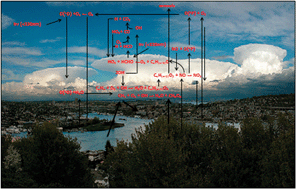Theoretical studies of atmospheric reaction mechanisms in the troposphere†
Abstract
The chemistry of the atmosphere encompasses a vast number of reactions acting on a plethora of intermediates. These reactions, occurring sequentially and in parallel, give rise to intertwined and irreducible mechanisms describing the complex chemical transformations of organic and inorganic compounds in the atmosphere. The complexity of this system is that it requires combined experimental, theoretical, and modeling approaches to elucidate the characteristics of the individual reactions, and their mutual interaction. In this review, we describe recent results from quantum chemical and theoretical kinetic studies of relevance to atmospheric chemistry. The review first summarizes the most commonly used theoretical methodologies. It then examines the VOC oxidation initiation channels by OH, O3, NO3 and Cl, followed by the reactions of the

- This article is part of the themed collection: Atmospheric chemistry

 Please wait while we load your content...
Please wait while we load your content...